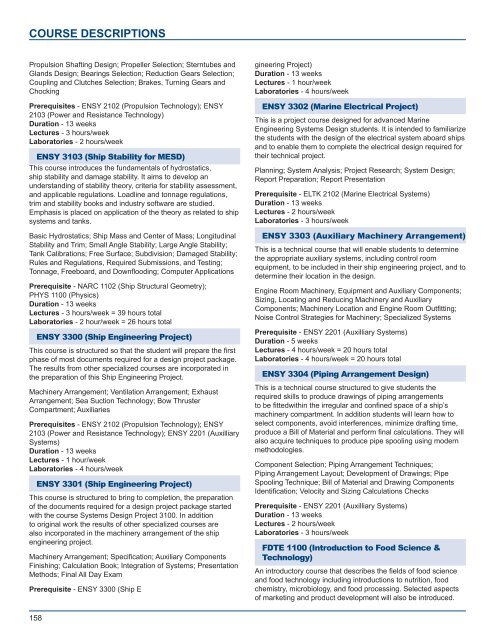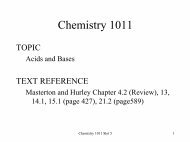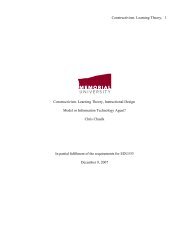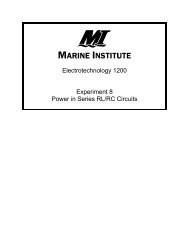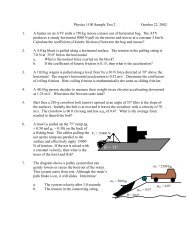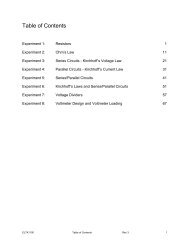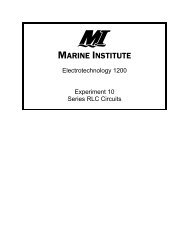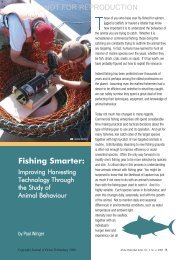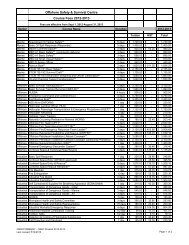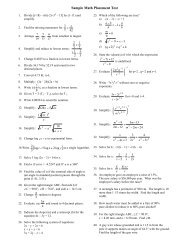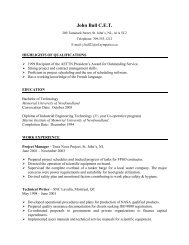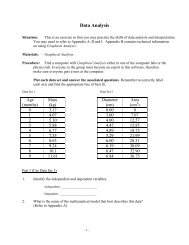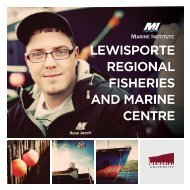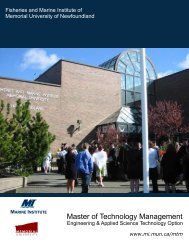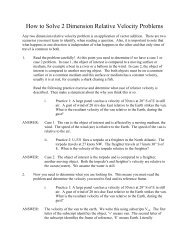Academic Calendar - Fisheries and Marine Institute - Memorial ...
Academic Calendar - Fisheries and Marine Institute - Memorial ...
Academic Calendar - Fisheries and Marine Institute - Memorial ...
Create successful ePaper yourself
Turn your PDF publications into a flip-book with our unique Google optimized e-Paper software.
COURSE DESCRIPTIONS<br />
Propulsion Shafting Design; Propeller Selection; Sterntubes <strong>and</strong><br />
Gl<strong>and</strong>s Design; Bearings Selection; Reduction Gears Selection;<br />
Coupling <strong>and</strong> Clutches Selection; Brakes, Turning Gears <strong>and</strong><br />
Chocking<br />
Prerequisites - ENSY 2102 (Propulsion Technology); ENSY<br />
2103 (Power <strong>and</strong> Resistance Technology)<br />
Duration - 13 weeks<br />
Lectures - 3 hours/week<br />
Laboratories - 2 hours/week<br />
ENSY 3103 (Ship Stability for MESD)<br />
This course introduces the fundamentals of hydrostatics,<br />
ship stability <strong>and</strong> damage stability. It aims to develop an<br />
underst<strong>and</strong>ing of stability theory, criteria for stability assessment,<br />
<strong>and</strong> applicable regulations. Loadline <strong>and</strong> tonnage regulations,<br />
trim <strong>and</strong> stability books <strong>and</strong> industry software are studied.<br />
Emphasis is placed on application of the theory as related to ship<br />
systems <strong>and</strong> tanks.<br />
Basic Hydrostatics; Ship Mass <strong>and</strong> Center of Mass; Longitudinal<br />
Stability <strong>and</strong> Trim; Small Angle Stability; Large Angle Stability;<br />
Tank Calibrations; Free Surface; Subdivision; Damaged Stability;<br />
Rules <strong>and</strong> Regulations, Required Submissions, <strong>and</strong> Testing;<br />
Tonnage, Freeboard, <strong>and</strong> Downflooding; Computer Applications<br />
Prerequisite - NARC 1102 (Ship Structural Geometry);<br />
PHYS 1100 (Physics)<br />
Duration - 13 weeks<br />
Lectures - 3 hours/week = 39 hours total<br />
Laboratories - 2 hour/week = 26 hours total<br />
ENSY 3300 (Ship Engineering Project)<br />
This course is structured so that the student will prepare the first<br />
phase of most documents required for a design project package.<br />
The results from other specialized courses are incorporated in<br />
the preparation of this Ship Engineering Project.<br />
Machinery Arrangement; Ventilation Arrangement; Exhaust<br />
Arrangement; Sea Suction Technology; Bow Thruster<br />
Compartment; Auxiliaries<br />
Prerequisites - ENSY 2102 (Propulsion Technology); ENSY<br />
2103 (Power <strong>and</strong> Resistance Technology); ENSY 2201 (Auxilliary<br />
Systems)<br />
Duration - 13 weeks<br />
Lectures - 1 hour/week<br />
Laboratories - 4 hours/week<br />
ENSY 3301 (Ship Engineering Project)<br />
This course is structured to bring to completion, the preparation<br />
of the documents required for a design project package started<br />
with the course Systems Design Project 3100. In addition<br />
to original work the results of other specialized courses are<br />
also incorporated in the machinery arrangement of the ship<br />
engineering project.<br />
Machinery Arrangement; Specification; Auxiliary Components<br />
Finishing; Calculation Book; Integration of Systems; Presentation<br />
Methods; Final All Day Exam<br />
Prerequisite - ENSY 3300 (Ship E<br />
gineering Project)<br />
Duration - 13 weeks<br />
Lectures - 1 hour/week<br />
Laboratories - 4 hours/week<br />
ENSY 3302 (<strong>Marine</strong> Electrical Project)<br />
This is a project course designed for advanced <strong>Marine</strong><br />
Engineering Systems Design students. It is intended to familiarize<br />
the students with the design of the electrical system aboard ships<br />
<strong>and</strong> to enable them to complete the electrical design required for<br />
their technical project.<br />
Planning; System Analysis; Project Research; System Design;<br />
Report Preparation; Report Presentation<br />
Prerequisite - ELTK 2102 (<strong>Marine</strong> Electrical Systems)<br />
Duration - 13 weeks<br />
Lectures - 2 hours/week<br />
Laboratories - 3 hours/week<br />
ENSY 3303 (Auxiliary Machinery Arrangement)<br />
This is a technical course that will enable students to determine<br />
the appropriate auxiliary systems, including control room<br />
equipment, to be included in their ship engineering project, <strong>and</strong> to<br />
determine their location in the design.<br />
Engine Room Machinery, Equipment <strong>and</strong> Auxiliary Components;<br />
Sizing, Locating <strong>and</strong> Reducing Machinery <strong>and</strong> Auxiliary<br />
Components; Machinery Location <strong>and</strong> Engine Room Outfitting;<br />
Noise Control Strategies for Machinery; Specialized Systems<br />
Prerequisite - ENSY 2201 (Auxilliary Systems)<br />
Duration - 5 weeks<br />
Lectures - 4 hours/week = 20 hours total<br />
Laboratories - 4 hours/week = 20 hours total<br />
ENSY 3304 (Piping Arrangement Design)<br />
This is a technical course structured to give students the<br />
required skills to produce drawings of piping arrangements<br />
to be fittedwithin the irregular <strong>and</strong> confined space of a ship’s<br />
machinery compartment. In addition students will learn how to<br />
select components, avoid interferences, minimize drafting time,<br />
produce a Bill of Material <strong>and</strong> perform final calculations. They will<br />
also acquire techniques to produce pipe spooling using modern<br />
methodologies.<br />
Component Selection; Piping Arrangement Techniques;<br />
Piping Arrangement Layout; Development of Drawings; Pipe<br />
Spooling Technique; Bill of Material <strong>and</strong> Drawing Components<br />
Identification; Velocity <strong>and</strong> Sizing Calculations Checks<br />
Prerequisite - ENSY 2201 (Auxilliary Systems)<br />
Duration - 13 weeks<br />
Lectures - 2 hours/week<br />
Laboratories - 3 hours/week<br />
FDTE 1100 (Introduction to Food Science &<br />
Technology)<br />
An introductory course that describes the fields of food science<br />
<strong>and</strong> food technology including introductions to nutrition, food<br />
chemistry, microbiology, <strong>and</strong> food processing. Selected aspects<br />
of marketing <strong>and</strong> product development will also be introduced.<br />
158


